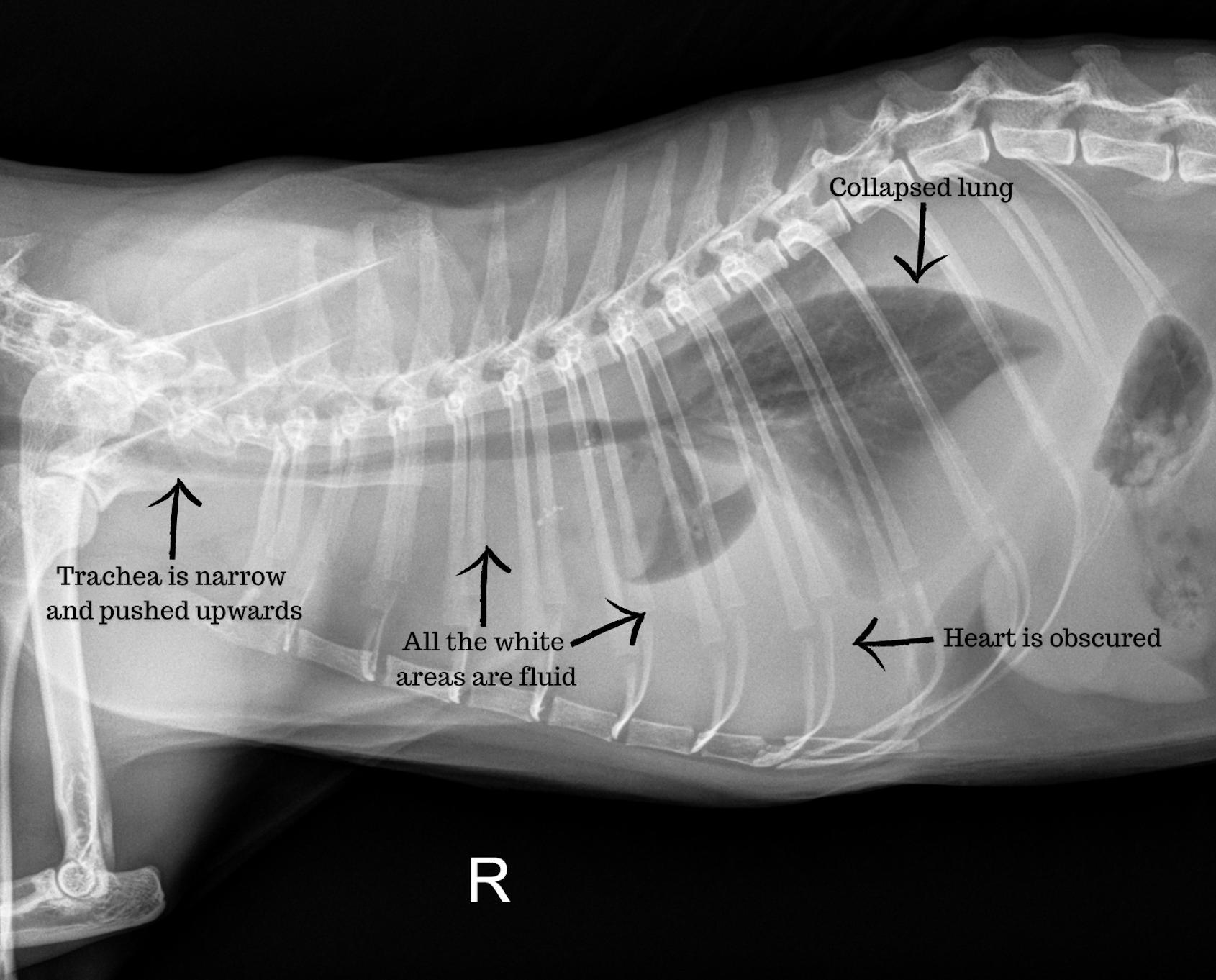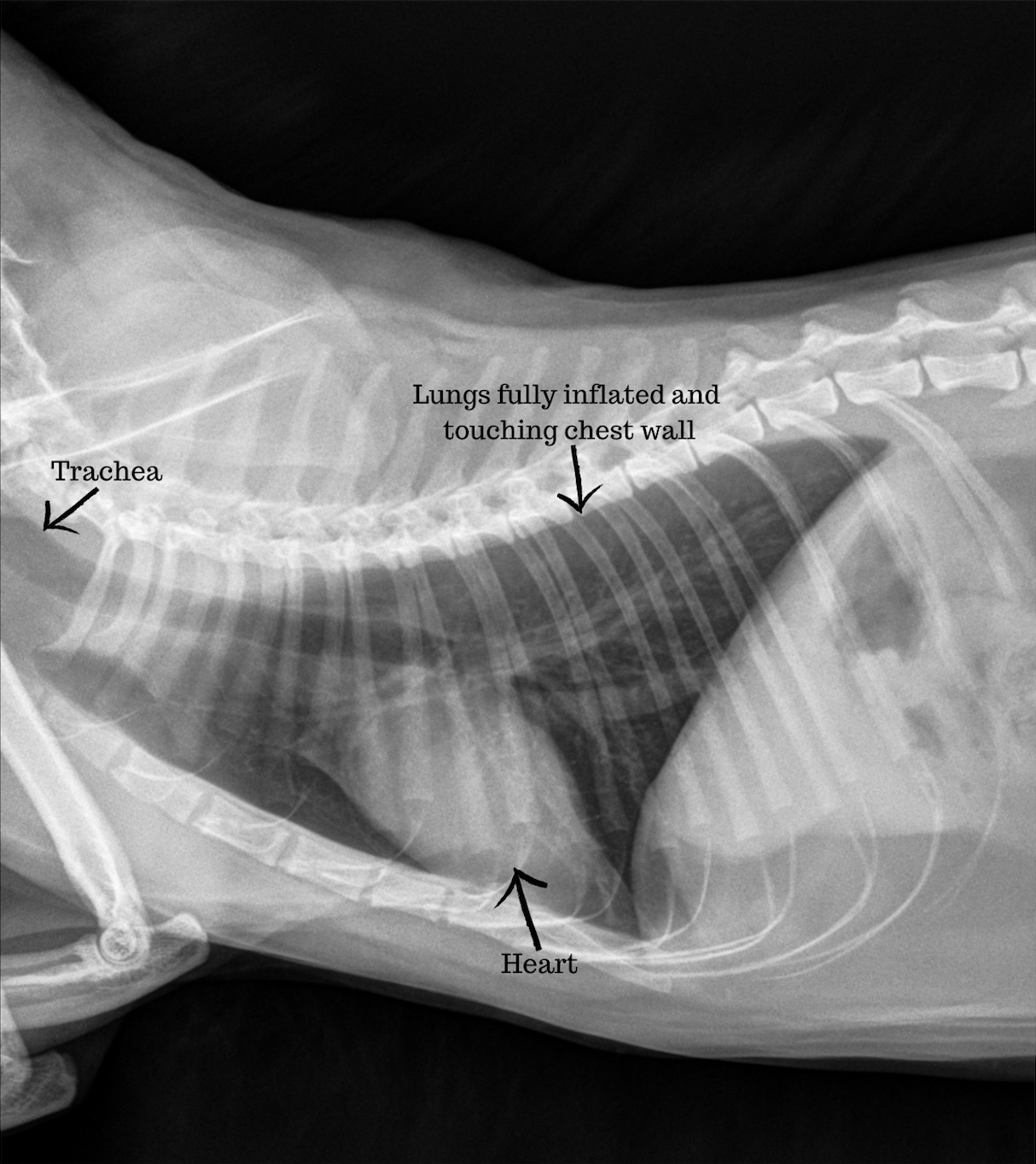By Dr. Heather Kovac
The Patient
Carlos, a 4 year old male neutered domestic shorthair cat, came to see me because he was having some trouble breathing. His owners noticed that he was taking smaller shorter breaths that seemed somewhat labored over the past few days. Carlos lived strictly indoors and had been very healthy up until that point.
The Case
On examination, I noticed that Carlos was really struggling to breathe. His respiratory rate was increased and he was using his abdominal muscles to help him breathe. Sometimes he would even open his mouth and pant like a dog. The word we use to describe labored breathing is dyspnea. He was not coughing and did not have any sneezing or nasal discharge. His temperature was normal but he had lost about 1 pound of weight since his previous visit. I recommended taking some chest xrays to determine the cause of the dyspnea. The xrays showed that his lungs were collapsed and retracted from the chest wall indicating that there was a large amount of fluid in the chest cavity. This is called pleural effusion. This means that fluid is accumulating in the chest cavity around the lungs making it impossible for the lungs to fill with air. The fluid was also obscuring his heart which could not even be seen on the xrays. The trachea (windpipe) was also being pushed dorsally towards the spine in an abnormal position. Carlos was essentially drowning in fluid.
(Below, is an X-ray image of Carlos' collapsed lungs)

(The X-ray image below shows what healthy lungs, without fluid buildup, look like)

The Treatment Plan
He needed an emergency thoracentesis. This is a procedure where a needle is inserted into the chest cavity and the fluid is drawn out with a syringe. His owners agreed to the plan. Carlos was a very good patient and did not need to be sedated for the procedure. I shaved an area on both the right and left side of his thorax (chest) to create a sterile window to insert the needle. Special care is taken when inserting a needle into the chest to prevent air from the outside from getting into the chest. I was able to remove a large volume of fluid from both sides of this thorax. He was able to breathe a little easier but he was not out of the woods yet. We needed to determine the cause of the fluid build-up. There are a few main differentials (causes) for pleural effusion in cats--the top one being cancer, followed by heart disease, and an infectious disease called FIP (feline infectious peritonitis). He needed more intensive care than I could provide so I transferred Carlos to a local 24 hour emergency and critical care hospital. Once there, he had an ultrasound of his chest which revealed a mass located just in front of the heart pushing up on the trachea. He also had enlarged lymph nodes in his abdomen. One of the lymph nodes was sampled with a long needle and it was determined that Carlos did indeed have cancer of the lymph nodes. Lymphosarcoma is a highly malignant aggressive type of cancer that can spread to all lymph nodes and really any organ it wants to. The mass in the chest was determined to actually be a severely enlarged lymph node located in the mediastinum, which is the region in the middle of the chest between the lungs containing the heart, esophagus, and major vessels.
The Outcome
Carlos immediately started a round of aggressive chemotherapy but unfortunately, the fluid in his chest returned very quickly and he was once again struggling to breathe. His owners made the very difficult decision to humanely euthanize Carlos as he was clearly suffering. As a veterinarian, my hope is that I can fix everything with my knowledge and skills. But, sadly, that is not the case for many of my patients. Another important part of my job is helping owners make difficult decisions about their pets and ultimately bring peace back into their lives. Carlos was a special cat and was very loved and is greatly missed by those who knew him, including me.
The Drake Center for Veterinary Care is an AAHA-accredited animal hospital located in Encinitas, CA. The Drake Center loves being a source of information for all pet owners across the country; however, if you have any questions regarding pet care and do not live in Encinitas, CA or surrounding cities, we encourage you to contact your local veterinarian.
